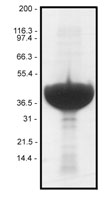Actin protein (>99% pure): chicken gizzard muscle
Product Uses Include
- Identification and characterization of smooth muscle actin binding proteins
- In vitro smooth muscle actin polymerization studies
Material:
Smooth muscle actin has been purified from chicken gizzard. The isotype composition of chicken gizzard smooth muscle actin is approximately 80% γ smooth muscle and 20% β cytoplasmic actin (1). Chicken gizzard smooth muscle actin has an approximate molecular weight of 43 kDa and is provided as a lyophilized white powder.
Purity:
Protein purity is determined by scanning densitometry of Coomassie Blue stained protein on a 12% polyacrylamide gel. Smooth muscle actin is >99% pure (see Figure 1).

Figure 1. Smooth Muscle Actin Protein Purity Determination. A 100 µg sample of chicken gizzard smooth muscle actin (molecular weight approx. 43 kDa) was separated by electrophoresis in a 12% SDS-PAGE system, and stained with Coomassie Blue. Protein quantitation was determined with the Precision Red Protein Assay Reagent (Cat. # ADV02).
Biological Activity:
The biological activity of smooth muscle actin is determined by its ability to efficiently polymerize into filaments in vitro and separate from unpolymerized components in a spin down assay. Stringent quality control ensures that >85% of the smooth muscle actin polymerizes in this assay.
References
- North, A. J. et al. 1994. J. Cell Sci. 107, 445-455
For product Datasheets and MSDSs please click on the PDF links below. For additional information, click on the FAQs tab above or contact our Technical Support department at tservice@cytoskeleton.com
 For a guide to performing actin polymerizations with this actin product please click here.
For a guide to performing actin polymerizations with this actin product please click here.
Question 1: Do you have purified actin protein that is primarily composed of gamma actin?
Answer 1: The isotype composition of chicken gizzard smooth muscle actin (Cat. # AS99) is approximately 80% g-smooth muscle and 20% b-cytoplasmic actin.
Question 2: How do I measure actin polymerization with the pyrene assay when there is no available pyrene conjugate for smooth muscle actin from chicken gizzard?
Answer 2: To examine the polymerization of unlabeled smooth muscle actin, please click here for a polymerization protocol that uses an excess of the unlabeled [smooth muscle] actin plus 10% of pyrene-labeled skeletal muscle actin. The pyrene muscle actin will not polymerize on its own at the concentration used in this assay, so the reaction is dependent on unlabeled smooth muscle actin for F-actin formation. In this way, the pyrene-labeled muscle actin is taken up and polymerized to serve as a reporter for polymerization of the unlabeled actin that is present at a much greater concentration.
If you have any questions concerning this product, please contact our Technical Service department at tservice@cytoskeleton.com



